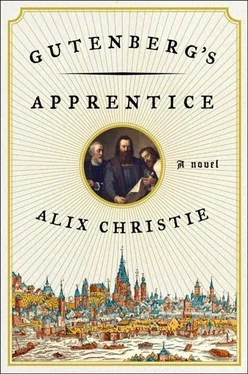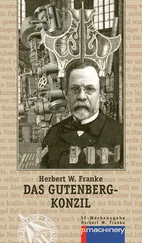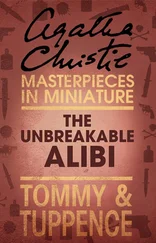“I shape the future now,” said Peter, straightening.
“Not quite like this.”
“I haven’t had a chance to write to tell you”—Peter spoke as though he hadn’t heard—“that I’ve been asked to join the rector’s office at the university.”
“Ah,” said Fust.
“Imagine how the trade could benefit,” his son went on. “I’ll see them first, whichever titles he selects. We’ll know exactly what the market will demand.”
The last time Fust passed through Paris, he’d asked his son to act as scout: to scour the stalls where books were sold across from Notre Dame, to keep his ears pricked and so learn the titles that the firm might sell to buyers east of the Rhine. Peter, meanwhile, toured him through the scribal workshop, one of dozens serving that great university. He showed him all the stacks of sections — written out by hand, then lent to students who would write out their own copies — hundreds of them, not only by the Greeks and Romans but the greatest scholars of the day: Duns Scotus, Bernard of Clairvaux, Thomas Aquinas. Those ink-stained scribes were like a mighty army, Fust had marveled, ranks of angels on the move.
“You said you envied me, when you last came to Paris.”
“That’s true.” His father pulled the flesh beneath his chin. “But that was all before I met this man.”
“This ‘most amazing man.’” Peter made no attempt to disguise his scorn.
“Look first.” His father reached into his lap, brought out a set of folded sheets, and laid them on the table. “Just look. And then I think you’ll understand.”
The quire — five folded, nested sheets — was of parchment of middling quality. Part of a schoolbook, judging by its short, square shape. Peter recognized at once the Latin grammar of Donatus: he had written out those declinations a thousand times. A common, tawdry work; he looked up, horrified.
“Feel,” his father said, and flipped the booklet to its last, blank page. He lifted Peter’s finger, rubbed it lightly on the empty space.
He felt a stippling, a kind of roughness on the hide. As if the parchment maker had not scraped the skin entirely smooth. He rubbed two fingers, three, and all at once they sensed a strange, sharp symmetry. He flipped the page back to its written side. His blood jumped then, his palms grew damp. The textura lettering was squat and ugly, yet every string of letters was unnervingly even, all across the line. Each of those lines ended with an utter, chilling harmony, at precisely the same distance from the edge. What hand could write a line that straight, and end exactly underneath the one above? What human hand could possibly achieve a thing so strange? He felt his heart squeeze and his soul flood with an overwhelming dread.
“You see now. Why I had to call you back.” Fust’s voice was high.
“What work is this? What hand did this?”
“No hand.” His father took his fingertip again. “Feel how it sinks? The way the ink lies not on top, but in a hollow in the skin?”
Peter closed his eyes to sense it more precisely. It was as Fust had said. The parchment yielded in some way: it was not smooth beneath the ink, as when he wrote it with his pen. “Whose work is this?” he said again.
Fust’s heavy face was shining. “This man they call Gutenberg has found a way to make the letters out of metal. He lays the ink upon each one, then stamps them in the page.”
Peter raised it to his eyes. So close that he could see the faint depression, a slope so slight as to be almost imperceptible: from the surface to the gully of each stroke. The space in which the angels — or the devil, surely — danced upon a pin. He could not speak at first, the shock was so extreme.
“I was approached by a man who knew I dealt in books.” His father mopped his brow, as if relieved to share this thing at last. “Gutenberg sought an investor, I was told. I went to see him, and he showed me this.” The man wouldn’t show him more, though, he told Peter, nor divulge how it was done. For his part, he’d been mystified, he added: he had never heard of any Elder family having anything to do with books. He’d thought that man’s whole clan content with running half the abbeys and the Mint, and weaving gold from wholesale cloth they sold beneath St. Martin’s eaves.
“I thought, like you,” he said as he pressed Peter’s hand, “that it was just another of those wretched grammars. But then this Gutenberg said he made it with a new technique. Ars impressoria , he calls it. To think he’s been at work at this, in secret, just a lane or two away. ..
“You know the house.” Peter heard the words dimly through the roaring in his brain. “The Hof zum Gutenberg, on Cobblers’ Lane.”
“I have a trade,” he said thickly and flung the sheets back on the table.
But Fust by then was standing, pacing, giving not the slightest indication he had heard. “It’s not the evenness — that’s just one part of it!” His voice was high; his cheeks were flushed. He had a canny and familiar look on his trader’s face — yet also a strange expression Peter didn’t think he’d ever seen. A kind of ravishment, an exaltation. Fust turned and fired a question. “It would take you how long — four days, five? — to copy this?”
“Two days. At most.” Peter was fast, and young, and proud.
“In those two days, this Gutenberg can make, by ‘printing,’ as he calls it, half a dozen copies, each one perfectly alike.” Fust came around the table and reached for Peter’s wrist. “Without the need to wear your fingers to the bone.”
His son was pinned, immobile. Fust loomed above him, blocking out the bright stars in the sky.
“Imagine it! My God, you have to see what this will mean. We can make ten times, twenty times as many copies of a book — in the same time and at the same cost.” His father’s hands were flailing in the air. “A book like this — or even longer ones. It’s limitless.” The look of wonder was replaced by triumph. He dropped a hand on Peter’s shoulder and shook him hard. “The moment I saw it, I was certain. This is the miracle the Lord has been preparing for us all along.”
“A blasphemy, more like, or just some shoddy trick.” Peter shook Fust’s hand off, reached back for the printed sheets. In truth that booklet was a soulless, lousy thing. The letters were as rough as those cheap woodcarvings that the Dutchmen hawked; the lines were blotchy and the edges slopped with ink.
Fust darkened. Then he straightened, and wiped a hand across his face. “But you must see. It is no accident that brought you here. Each step that brought you to this house, each book we’ve seen and sold, or that you yourself have written. What were they all, if not a preparation? What is our purpose here, if not for you to learn this blessed art?”
“Blessed?” Peter jerked his hand; the pamphlet dropped. He stood and pushed the chair away. “This is no art. Who is the scribe here, you or I?” He shook his head. “I am a master of this art, as you well know. I have a trade, a life.”
“You’ve had your wander years.” His father’s voice was curt. “They’ve gone on long enough. I need you here.” His feet were planted and his look severe.
“You’d keep me here?” It came out as a bleat.
“I shouldn’t even have to ask.”
Peter felt his face flame up. And still he twisted, scrabbling for a handhold. “I never heard of any Elder lifting up a tool. What proof have you that this man Gutenberg has even made this in the way you say?”
The thing could easily have been a carved wood plate, as crude as any made to crank out images of saints and the few letters of their names.
“I am told that a goldsmith does the carving and the casting of the metal shapes.”
Читать дальше












